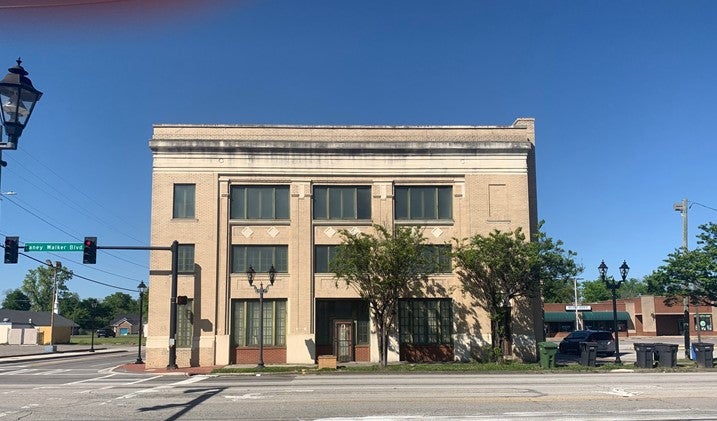Despite millions in state and federal Housing and Urban Development dollars, the area of Laney Walker Boulevard remains one of the most depressed areas of the city; however, at the turn of the 20th Century, the area thrived and was known as the “Golden Blocks.”
For almost two decades, The Penny Savings Loan and Investment Company was one of the main anchors of the area, and the original building remains as a decaying snapshot of yesteryear.
The Penny Savings Bank was chartered in 1910, according to Historic Augusta, and served what was a growing and emerging Black middle class.
The end of the Civil War and abolishment of slavery actually changed very little for the average Black citizens living in the South. While the people were free and didn’t have to deal with cruel overseers they couldn’t escape, they remained, for the most part, chained to the land.
The advent of “share-cropping” created an almost European feudal model of society in the South. Farmers routinely found themselves one bad harvest away from starvation.
Black cotton farmers no longer had a plantation owner responsible for their health, shelter and daily food rations. Many packed up their families fled the South and moved to the industrial North to find factory work.
According to the National Archives, the Great Migration that began in the early 20th century saw some six million Black citizens seek a better life by moving North and Northwest.
Unfortunately, they did not find the Land of Milk and Honey.
The workers simply traded back-breaking work under a broiling sun for an even longer workday toiling in the bowels of steel smelting factories. In an era before birth control, people had large families they couldn’t afford to feed, and so it was common to see children at the looms and inside coal mines working alongside their parents.
Most people of the time did not have the available cash to meet the minimum balance at a bank.
However, those living in Augusta enjoyed a leg up over the generations that predated the Civil War through the free Black community of Springfield Village in the heart of downtown.
Springfield was led by business professionals, lawyers and doctors. Efforts by people such as Emily Tubman and Lucy Craft Laney made sure that Black children in the community received quality education.
It would be these Black professionals who would be instrumental in building the Augusta Canal, and historians now believe they were also a major part of the Underground Railroad.
Augusta and the Springfield Village were by no means that ‘shining city on a hill.’ Racism and segregation were still a part of daily life, and Black leaders felt that the best way to combat ‘separate but equal’ was to embrace it on their own terms.
According to the late Augusta historian Ed Cashin, the Pilgrim Health and Life Insurance Company became the first major Black owned company in Augusta when it opened in 1898.
A decade later, 15 businessmen would come together and launch the The Penny Savings Loan and Investment Company, and business boomed as soon as the ribbon was cut on its headquarters at the corner of Laney-Walker Boulevard and 9th Street (today known as James Brown Boulevard).

The bank took out advertisements that urged the community to be frugal and save:
“Some people fritter away the best and most precious years of their lives waiting for some fortunate accident to happen, far better it is to save up all your nickels, dimes and dollars, put them in a bank account and have fortune guaranteed,” reads an ad published in The Augusta Chronicle on May 24, 1924.
The turbulent economics of the Roaring Twenties took its toll on the bank. As was the custom of the time and still is to a degree, the bank would use depositors money to invest in real estate.
In 1928, the bank filed for “voluntary bankruptcy” to forestall a run on the bank by depositors, according to media reports of the time, but the bank did not survive. As it turned out, the failure of The Penny Savings Bank was the proverbial canary in the coal mine as just barely over a year later, the stock market crash of 1929 would decimate the banking industry across the nation.
The Penny Savings Bank created a lasting legacy as it proved that people would invest and trust their savings to a “Negro-owned” banking institution.
The creation of the bank also started an investment boom with Black entrepreneurs opening shops all over downtown. The Lennox Theater and Red Star Theater both provided entertainment where the mostly Black audiences did not have to follow Jim Crow Laws and sit in the balcony or back of the theater.
Today, the Lennox is gone and the Red Star has been lovingly restored and houses professional offices and loft apartments, but the Penny Savings Bank building has been left to decay and is on Historic Augusta’s Endangered Properties List.
The building has been owned by the Augusta Landbank Authority since 2011, according to property records.
Former Augusta Commissioner Marion Williams says it is “disgusting” that the city has allowed the building to fall into neglect and says he is mulling over running for the commission again.
“We shouldn’t allow them to build anything until they prove they can take care of what we already have. We shouldn’t be allowing them to build a $200 million new James Brown Arena when both the Boathouse and the Penny Savings Bank are falling in on themselves,” Williams said.
…And that is something you may not have known.
Scott Hudson is the Senior Investigative Reporter and Editorial Page Editor for The Augusta Press. Reach him at scott@theaugustapress.com












